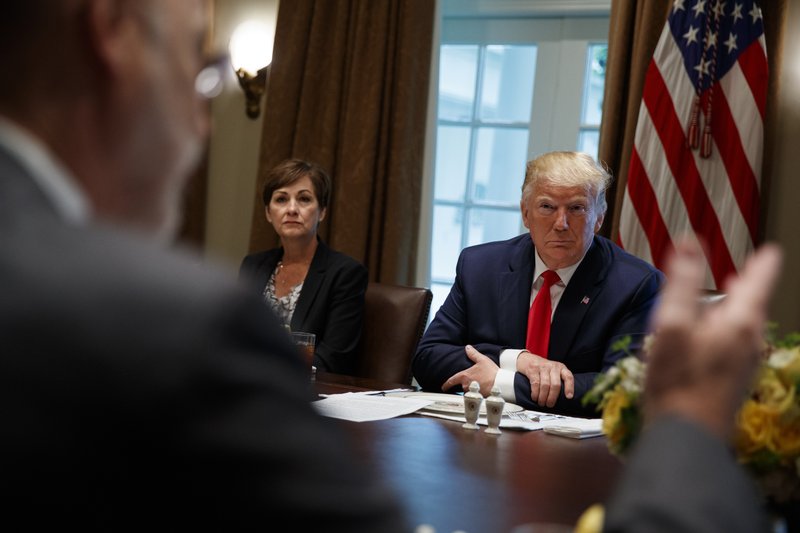WASHINGTON -- President Donald Trump shifted gears Friday on election interference, saying "of course" he would go to the FBI or the attorney general if a foreign power offered him dirt about an election opponent.
Trump said earlier in the week that he would not necessarily contact law enforcement if offered damaging material from an overseas source.
But in his latest comments, the president still said he would look at the proffered information to see whether it was "incorrect."
"Of course, you have to look at it," Trump said during a birthday appearance on Fox and Friends. He added: "But of course, you give it to the FBI or report it to the attorney general or somebody like that. You couldn't have that happen with our country, and everybody understands that."
That was a step back from his comments to ABC days earlier.
"OK, let's put yourself in a position: You're a congressman, somebody comes up and says, 'Hey I have information on your opponent.' Do you call the FBI? You don't," Trump said in an interview that aired Wednesday. "I'll tell you what. I've seen a lot of things over my life. I don't think in my whole life I've ever called the FBI."
His assertion that he would be open to accepting a foreign power's help in his 2020 campaign alarmed Democrats, who condemned it as a call for further election interference.
Asked by ABC News what he would do if Russia or another country offered him dirt on his election opponent, Trump said: "I think I'd want to hear it."
"There's nothing wrong with listening," he added.
On Friday, Trump shot back at House Speaker Nancy Pelosi, D-Calif., claiming she had made "a fascist statement" the day before when she criticized him for saying he was open to accepting opposition research from a foreign government.
"It's a fascist statement. It's a disgraceful statement," Trump said during the Fox interview. "I call her Nervous Nancy. She's a nervous wreck."
Pelosi spoke out Thursday about Trump's comments on foreign opposition research, echoing other Democrats who said that what Trump told ABC News showed he had learned nothing from the investigation of special counsel Robert Mueller into Russian election interference in 2016.
"Yesterday the president gave us once again evidence that he does not know right from wrong," Pelosi said, adding: "I believe that he has been involved in a criminal cover-up."
Her latter comment referred to the Trump administration's limited cooperation with House investigations related to whether Trump obstructed Mueller's probe.
"For her to make a statement like that is outrageous," Trump said.
Trump also complained about the congressional investigations being conducted under Pelosi's watch, suggesting they were too onerous.
"Isn't it amazing that constantly every day somebody gets a letter," Trump said. "'Come into Congress, come into Congress.' It's like death through a thousand wounds. And I will tell you it's so unfair what they are doing."
Mueller's investigation documented Russian efforts to boost Trump's campaign and undermine that of his Democratic rival, Hillary Clinton.
In a segment released Friday from the president's interview earlier this week, Trump told ABC that "it doesn't matter" what former White House counsel Donald McGahn told investigators and that McGahn may have been confused when he told prosecutors he had been instructed to seek Mueller's removal.
McGahn was a crucial witness for Mueller, spending hours with investigators and offering detailed statements about episodes central to the special counsel's investigation into possible obstruction of justice. McGahn described how Trump directed him to press the Justice Department for Mueller to be fired by insisting that he raise what the president perceived as the special counsel's conflicts of interest.
Trump denied that account, saying, "The story on that very simply, No. 1, I was never going to fire Mueller. I never suggested firing Mueller."
Asked why McGahn would have lied, Trump said, "Because he wanted to make himself look like a good lawyer. Or he believed it because I would constantly tell anybody that would listen -- including you, including the media -- that Robert Mueller was conflicted. Robert Mueller had a total conflict of interest."
Though Mueller's investigation didn't establish a criminal conspiracy between Russia and the president's campaign, Trump praised WikiLeaks in 2016 and at one point implored hackers to dig up dirt on Clinton.
Donald Trump Jr.'s role in organizing a 2016 meeting with a Russian lawyer offering negative information on Clinton was also a focus of Mueller's probe of Russian meddling in the last presidential campaign. Trump Jr. spoke with the Senate Intelligence Committee for about three hours Wednesday to clarify an earlier interview with the committee's staff.
Information for this article was contributed by Jonathan Lemire and Zeke Miller of The Associated Press; and by John Wagner of The Washington Post.
A Section on 06/15/2019
